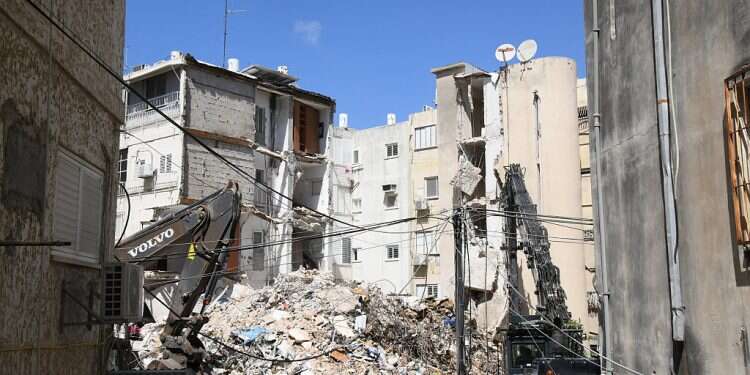Hundreds of Israelis living in old buildings that have been classified as dangerous are not insured in the event of a collapse of the building, Israel Hayom has learned.
Follow Israel Hayom on Facebook, Twitter, and Instagram
According to a report compiled by the Knesset Research Center and seen by Israel Hayom, the current situation in Israel is that building insurance does not provide coverage in the event of the collapse of a building due to its age.
Compiled at the request of MK Mossi Raz, the report states that from a legal point of view, it is the responsibility of property owners to restore a building and ensure public safety, and it is the responsibility of the local authority to supervise this. However, the local authority does not have a legal liability to the tenants in the event that a building has been declared dangerous and in immediate risk and an injunction has been issued to evacuate the building, demolish, or seal off the building. Moreover, the local authority does not bear the responsibility to find alternative accommodation for tenants in the event that a building has been declared dangerous, and neither does it have the responsibility to advance urban renewal on the lot.
The situation is that many people live in old buildings that may at one point or another have to be evacuated due to an immediate risk of collapse. There are no guarantees or compensation in this event, and people could find themselves facing ruin.
According to the inter-ministerial steering committee for preparation for earthquakes, ten towns are at high risk of immediate danger of collapse of buildings: Tiberias, Kiryat Shmona, Safed, Katzrin, Bet Shean, Hatzor, Afula, Migdal Ha'Emek, Rosh Pina and Eilat.
However, the risk to buildings is not restricted to these towns. In Tel Aviv for example, there are no less than 885 buildings that are classified as dangerous. In Rishon Letzion some 500 buildings are classified as dangerous, in Ashdod -143, and Beersheba - 23. Notably, there is no national database covering this issue.
It should be recalled that in September 2021, a building collapsed in Holon; the 34 families living there were evacuated from the building before it collapsed. In May 2022, the insuring company notified the residents of the building that it would not pay compensation as deterioration that was the cause of the collapse was not included in the policy.
Several meetings were held at the prime minister's office in October-November 2021 to formulate a government decision on the issue whereby inter-ministerial work teams would prepare a response to the central issues. However, because of disagreements between the Ministry of Housing and Construction and other government ministries, this never happened. There is currently no government policy on the issue and the government is not currently working to formulate such a policy.
Subscribe to Israel Hayom's daily newsletter and never miss our top stories!
What is the situation in the rest of the world? In Romania, residents are required to take out insurance for natural disasters at a cost of between 10 to 20 euros per year. In Greece, a law is due to come into effect that will require residents to take out home insurance for natural disasters in at-risk areas. In Iceland and Portugal, residents are required to insure their homes for fires. In Turkey, the property must be insured for earthquakes and in Italy, there are tax breaks on mortgage repayments. Additional countries also give tax on mortgage payments for persons working from home or renting out an apartment.
Raz, who commissioned the report, said: "The document's findings point to the absence of an adequate insurance response to cases of collapsed buildings. This creates a situation whereby buildings collapse and the owners lose their property and possessions and get no compensation. This is a very worrying picture and requires us to examine in-depth responses at both the safety and legislative levels.
This article might include sponsored and commercial content/marketing information. Israel Hayom is not responsible for its nature or its credibility. The publication of such content or information shall not be considered a recommendation and/or an offer by Israel Hayom to purchase and/or use the services or products mentioned in this article.




